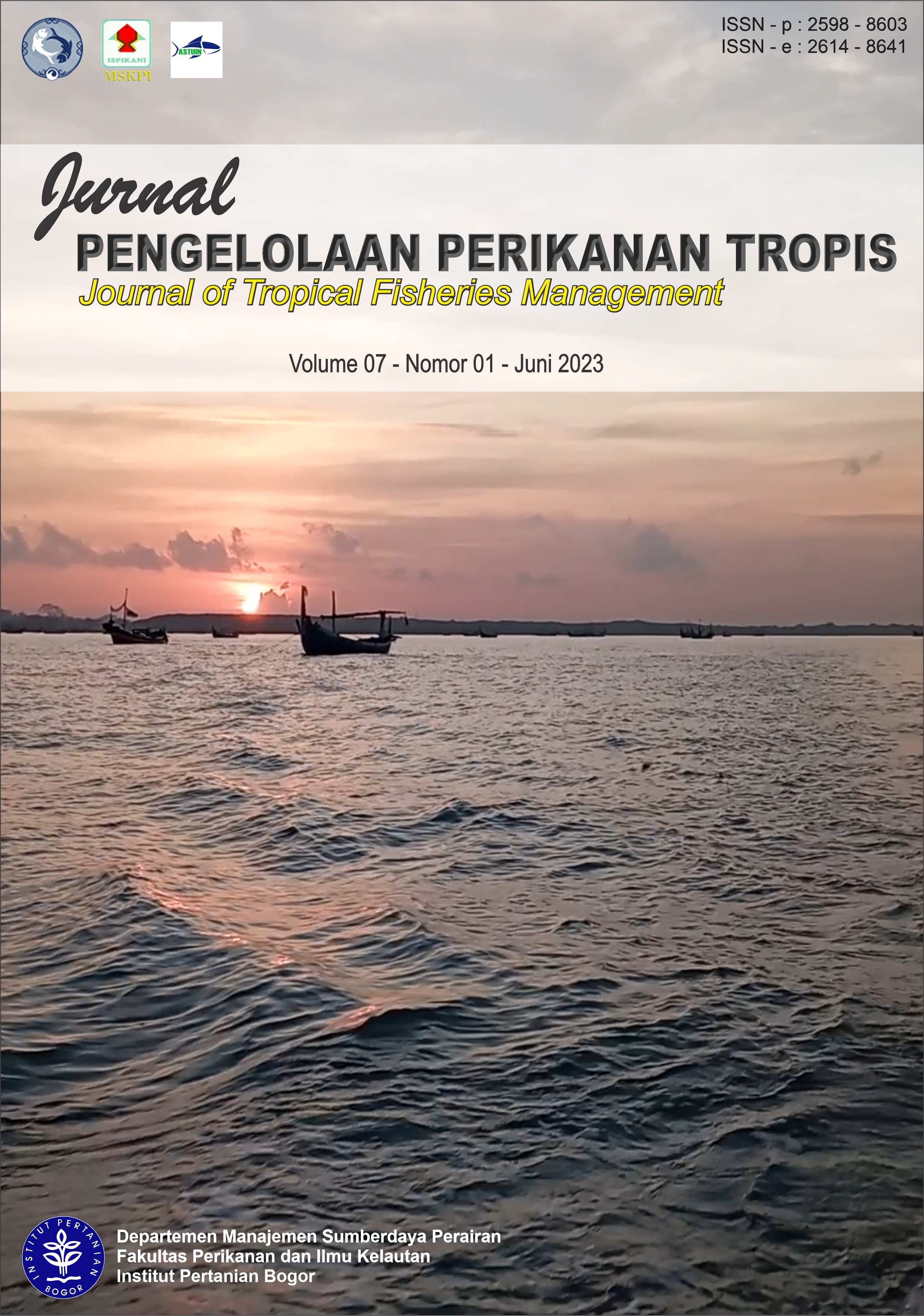Inventory of Potential and Community Structure of Mudskipper at Coast of Bahak Indah, Probolinggo- East Java
Inventarisasi Komunitas Ikan Gelodok (Mudskipper) pada Habitat Berbeda di Pantai Bahak Indah, Probolinggo –Jawa Timur
Abstract
The coast of Bahak Indah is one of the beaches in Probolinggo Regency where many types of mudskipper are found, but until now, not much is known about the ecological studies related to the mudskipper community. This study aims to inventory the mudskipper community as scientific information for the purpose of habitat conservation. The research was conducted from January to February 2022. Purposive determination of observation stations was based on the presence or absence of mangrove vegetation. Observations at each station used a systematic sampling method with the help of line transects and plots. The data obtained were analyzed including length and weight of fish, species composition, abundance, frequency of presence and Important Value Index. The results of the study found four species of mudskipper, namely: Boleophthalmus pectinirostris, Boleophthalmus boddarti, Periophthalmus chrysospilos and Periophthalmodon schlosseri. All mudskipper populations in mangrove habitats have greater length and weight than coastal habitats without mangrove vegetation. The highest number, species composition, abundance, and frequency of presence of mudskipper species were found in the mangrove vegetated habitat. The highest Important Value Index (INP) was in habitats with mangrove vegetation, namely B. boddarti species with a value of 66.69%, while in coastal habitats without mangrove vegetation, P. chrysospilos species with a value of 73.62%. The results of this study indicate that mangrove vegetation has an important role as an ideal habitat for gelodok fish, so the existence of mangrove vegetation needs to be maintained through conservation and rehabilitation efforts.
Downloads
References
Akbar N, Bode ID, Baksir A, Tahir I, Paembonan RE, Marus I, Wibowo ES. 2020. Distribusi dan karaktersitik habitat ikan tembakul (Gobidae spp). di Pesisir Pantai Pulau Terbate Provinsi Maluku Utara. Jurnal Manajemen Riset dan Teknologi, 1(2): 49–58.
Elviana S, Sunarni S. 2018. Komposisi dan kelimpahan jenis ikan gelodok kaitannya dengan kandungan bahan organik di perairan estuari Kabupaten Merauke. Agrikan: Jurnal Agribisnis Perikanan, 11(2): 38. https://doi.org/10.29239/j.agrikan.11.2.38-43
Fachrul MF. 2007. Metode Sampling Bioekologi. Jakarta: Bumi Aksara.
Haryani NS. 2013. Analisis perubahan hutan mangrove menggunakan citra landsat. Jurnal Ilmiah Widya, 1(1): 72–77.
Irawan D, Nurdiansyah SI, Safitri I, Kushadiwijayanto AA. 2020. Identifikasi, kelimpahan dan tipe karakteristik habitat ikan tembakul Desa Pasir Kabupaten Mempawah Kalimantan Barat. Barakuda, 452(2): 43–49. https://doi.org/https://doi.org/10.47685/barakuda45.v2i2.79
Krebs CJ. 1985. Ecology: The Experimental Analysis of Distribution and Abundance. Third Edition. Haeper and Row Publisher.
Latuconsina H. 2011. Komposisi jenis dan struktur komunitas ikan padang lamun di perairan Pantai Lateri Teluk Ambon Dalam. Agrikan: Jurnal Agribisnis Perikanan, 4(1): 30. https://doi.org/10.29239/j.agrikan.4.1.30-36
Latuconsina H. 2020a. Ekologi Perairan Tropis; Prinsip Dasar Pengelolan Sumber Daya Hayati Perairan. Yogyakarta: UGM Press. 284 hal.
Latuconsina H. 2020b. Ekologi Ikan Perairan Tropis. Biodiversitas, Adaptasi, Ancaman dan Pengelolaannya. Yogyakarta: UGM Press. 564 hal.
Low WP, Lane DJW, Ip YK. 1988. A comparative study of terrestrial adaptations of the gills in three Mudskipper-Periophthalmus chrysospilos, Boleophthalmus boddaerti, and Periophthalmodon schlosseri. Marine Biological Laboratory, 175(3): 434–438.
Muhtadi, Ramadhani A. 2016. Identifikasi dan tipe habitat ikan gelodok (Famili: Gobiidae) di Pantai Bali Kabupaten Batu Bara Provinsi Sumatera Utara. Biospecies, 9(2): 1–6.
Nagelkerken I, Kleihnen S, Klop T, van den Brand RACJ, de la Morinière EC, van der Velde G. 2000. Dependence of carribean reef fishes on mangroves and segrass beds as nursery habitats: a comparison of fish faunas between bays with and without mangroves/seagrass beds. Marine Ecology Progress Series, 214: 225–235.
Pattipeilohy M. 2014. Fenomena pendangkalan zona pasang surut hutan mangrove teluk dalam ambon serta upaya pengembangan ekowisata. Jurnal Pena Sains, 1(2): 56–63.
Polgar G, Ghanbarifardi M, Mill S, Agorreta A, Aliabadian M, Esmaeili, Khang TF. 2017. Ecomorphological adaptation in three mudskipper (Teleostei: Gobiodei: Gobiidae) from the persian gulf and the gulf of oman. Hydrobiologia, 91–111.
Rohmawati VD, Latuconsina H, Zayadi H. 2021. Komunitas ikan pada habitat mangrove berbeda di Banyuurip, Ujung Pangkah-Kabupaten Gresik. Jurnal Agribisnis Perikanan (Agrikan), 14(1): 73-79.
Salim G, Weliyadi E. 2018. Model pertumbuhan populasi ikan gelodok (P. barbarus) Di Kawasan Konservasi Mangrove Bekantan Kota Tarakan. Jurnal Borneo Santek, 1(2): 66–74.
Frimanozi S, Zakaria IJ, Izmiarti. 2014. Komposisi dan struktur komunitas ikan kepe-kepe (Famili Chaetodontidae) di Perairan Pantai Taman Nirwana, Kota Padang. Jurnal Biologi UNAND, 3(2): 92–96.
Sukandar, Harsindhi CJ, Handayani M, Dewi CSU, Maulana AW, Supriyadi, Bahroni A. 2016. Profil desa pesisir provinsi jawa timur volume 1 (Utara Jawa Timur. Dinas Perikanan Dan Kelautan Provinsi Jawa Timur, 1(9): 1–151.
Sunarni, Melmambessy EHP, Mote N, Rahmatia, Hamuna B. 2019. Length-weight relationship and condition factor of mudskipper Boleophthalmus pectinirostris from Maro Estuary, Merauke Regency, Papua. Journal of Egological Engineeering, 20(8): 199–204.
Wyatt-Smith J. 1963. Manual of Malayan Silvicultur Part I-II. Malayan Florest Record No. 23. Forest Research Institut of Malaysia.
Copyright (c) 2023 Journal of Tropical Fisheries Management

This work is licensed under a Creative Commons Attribution 4.0 International License.
After the article is submitted and published in this journal, it is fully copyrighted by the Journal of Tropical Fisheries Management. If excerpts from other copyrighted works are included, authors must obtain written permission from the copyright owner and give credit to the source in the article. Then, authors or reader is allowed to copy, share, and redistribute articles/material in any form. But it must still include the appropriate source and credit because the article in this journal is licensed by Creative Commons Attribution 4.0 International License (CC BY 4.0).




1.png)








